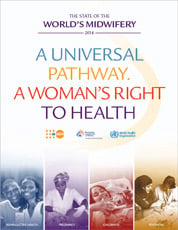Midwives – and people with midwifery skills – are the main caregivers for women and their newborns during pregnancy, labour, childbirth and in the post-delivery period. Skilled midwives are the difference between life and death for close to 300,000 women each year, and ten times that many infants.
In addition to their work caring for women during and after childbirth, midwives provide a wide range of assistance, including advancing women’s and girls’ rights, care in humanitarian emergencies, training and supervision, and counselling services on family planning and reproductive health.
Yet there are massive midwife shortages around the world. In the Asia and the Pacific region, deaths and poor health among women remain unacceptably high. Subregional differences in the number of deliveries attended by skilled health personnel are stark: from 79 per cent in South-East Asia and 74 per cent in the Pacific, to only 51 per cent in South Asia.
UNFPA, together with a network of over 30 partners, works at the global, regional and national level to scale up midwifery services.
On this International Day of the Midwife, UNFPA celebrates the work of midwives in contributing to the miracle of birth – and for the countless other things they do every day to contribute to the wellbeing of mothers and children around the world. The theme of this year’s day is Midwives: For a better tomorrow.
SPECIAL FEATURES
- Nepal: International Day of the Midwife in earthquake-shattered Nepal
- VIDEO: The crucial role of midwives in Asia-Pacific
FEATURE STORIES
- Afghanistan: Midwives help lower Afghanistan's towering maternal death rate
- Bangladesh: Professional midwives set to improve maternal and child health in Bangladesh
- Myanmar: Mobile teams resume reproductive health care in Rakhine, Myanmar
VOICES of MIDWIVES


